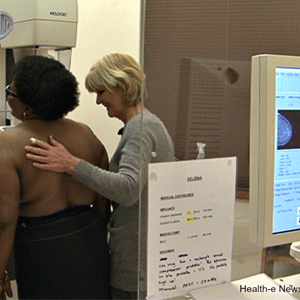
For many women in the Northern Cape, cancer remains a killer because of delayed diagnosis.
Scans remain centralised
"People in Douglas don't know what cancer really is," says Tina September, who lives in Douglas, about 170km outside Kuruman in the Northern Cape. "We don't know when we should go seek professional help."
"We found out too late about my mother's cancer," says September, who lost her mother to lung cancer. "We don't know where it started in her body, but if she had been diagnosed early, I believe we would have been able to save her."
Read: Fibre intake early in life can lower breast cancer risk
Nationally, most cancer treatment and diagnostic tools like computerised tomography (CT) scans remain centralised at provincial and specialist hospitals. For patients like Rachel, this means an almost 220km-round trip journey to Kimberley Provincial Hospital.
In some provinces, one CT scan serves dozens of referring hospitals. In some places, patients who have been diagnosed with cancer may have to wait about a month for the scan to confirm where the cancer is in the body. This wait can delay patients' access to treatment when some rural cancers are already diagnosed too late due to a lack of awareness.
Health promotion campaigns needed
Almost 60,000 South Africans are diagnosed with cancer annually, according to the National Cancer Registry, which was last updated in 2010. Despite a growing burden of non-communicable diseases like cancer in the country, numerous small, qualitative studies have shown low levels of cancer awareness among some communities in the country.
Read: Pap smear misses 46% of cervical cancer cases
A 2010 study conducted among about 200 Mangosuthu University of Technology female students found that only 31 percent of women surveyed had heard about Pap smear testing and only about a third of women knew the test was used to detect cervical cancer. Another 2010 study conducted among about 140 urban and rural women found that almost one-fifth of women had not heard of breast or cervical cancer and almost half of women did not know how to perform breast self-examinations to detect early signs of breast cancer.
Both studies recommended health promotion campaigns to increase cancer awareness.
For Puleng Mokgatla, being diagnosed with cancer just a few months after her mother, Makgauta, died of cancer was difficult.
Read: High price of cervical cancer
"My mom died because of womb cancer," Puleng said. "She found out only at the late stages of it. We tried everything to help her, but she did not make it."
Luckily for Puleng, her experience with her mother prompted her to go for screening and her cancer was diagnosed early.
'I was petrified'
Today, Puleng is a counsellor in Bethlehem, Free State who encourages other to go for screening early. According to Puleng, more people need to know the risk factors for cancer and its signs.
Read: Cancer treatment harmless to unborn babies
According to breast cancer survivor Marie Foster, there may also be a need for continued counselling post diagnosis.
"I was petrified as I knew very little about cancer and what to expect from treatment," says Foster, who also had to journey from Douglas to Kimberley Provincial Hospital for chemotherapy.
"When you have just had chemotherapy and are not feeling well, the last thing you feel like is a complicated, long journey home," says Foster, who eventually had a mastectomy. "I was really glad my family and friends supported me even if they also didn't now much about cancer."
Read more:
SA’s patent laws are preventing treatment for thousands with breast cancer
New South African research accelerates cervical cancer treatment
Mom delays chemo to protect 'saviour' baby
References
National Health laboratory service, http://www.nioh.ac.za/assets/files/NCR_Final_2010_tables(1).pdf
Asian Pacific Journal of Cancer Prevention, Vol 11, 2010, http://www.apocpcontrol.com/paper_file/issue_abs/Volume11_No1/127%20c%20Hoque.pdf
Ethnicity & Health, Volume 7, Issue 2, 2002, http://www.tandfonline.com/doi/abs/10.1080/1355785022000038588




 Publications
Publications
 Partners
Partners











